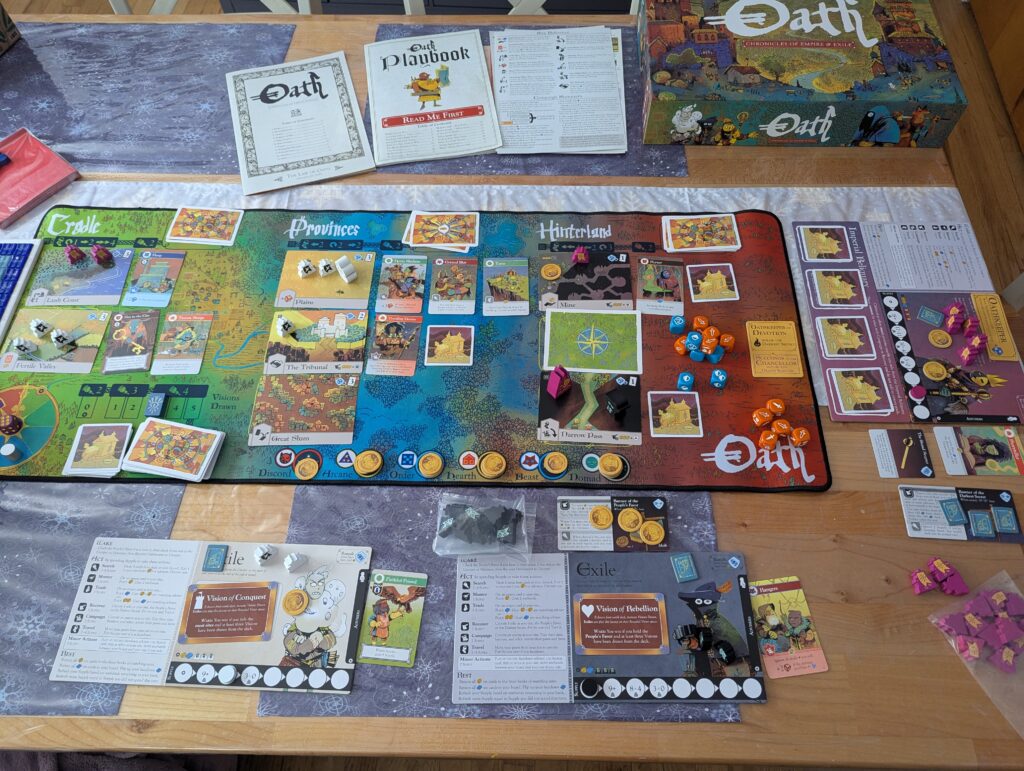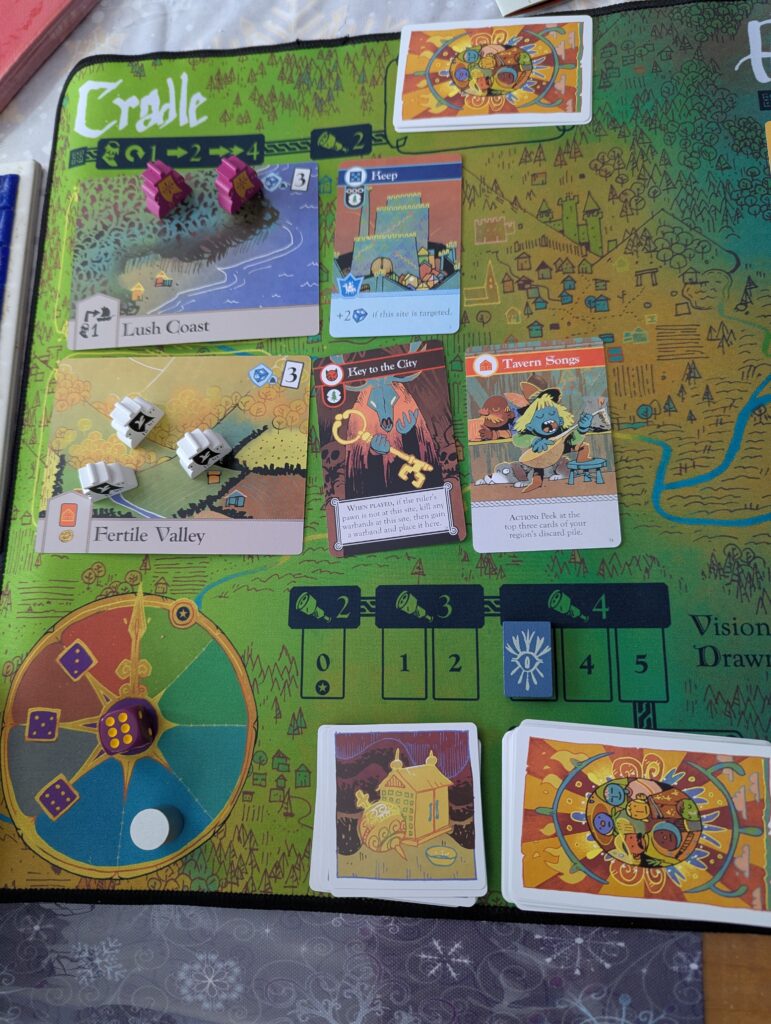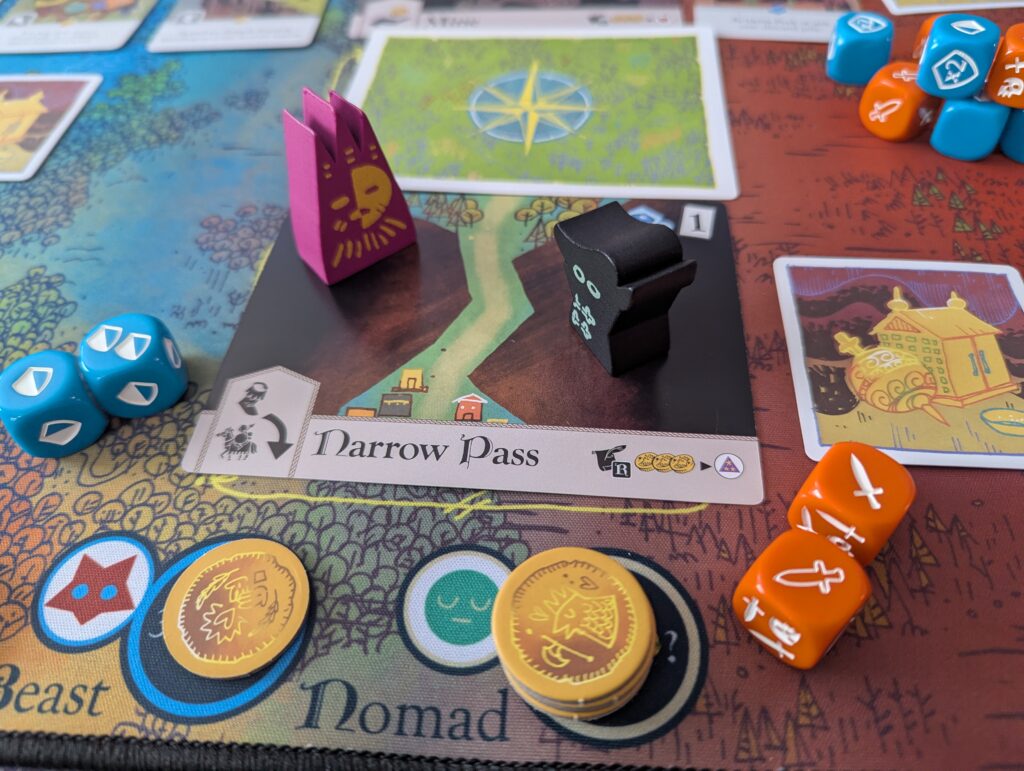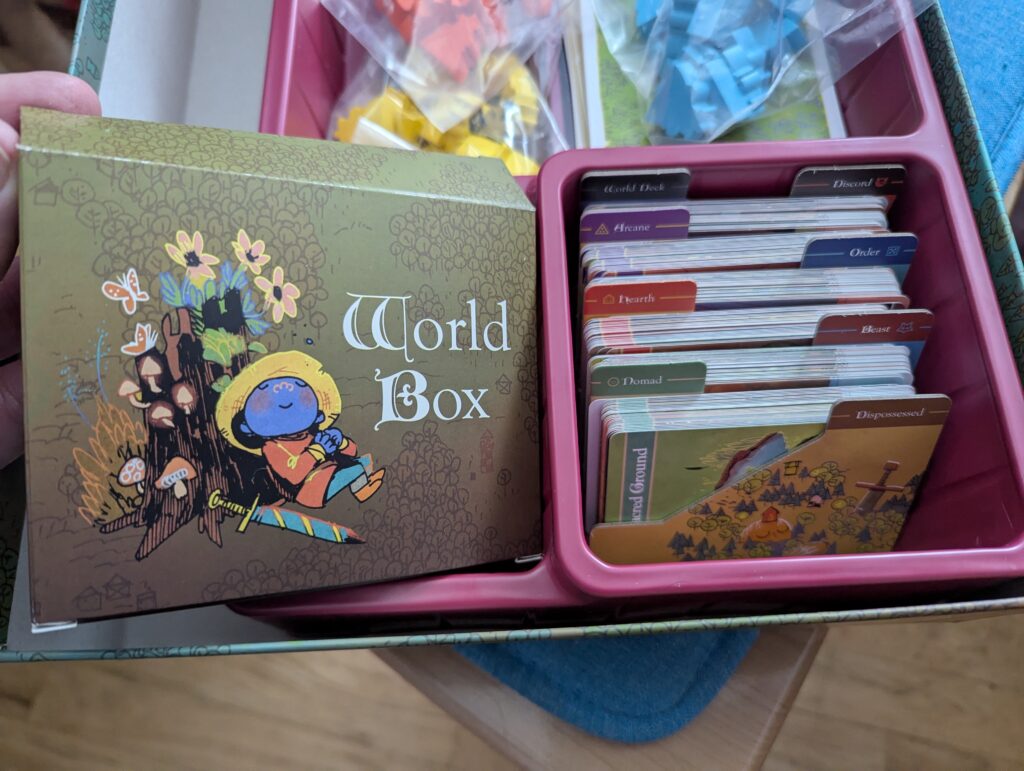
It’s good to be king. In theory. Leder Games poses the question of just what it means to win a crown and what comes after in their semi-legacy strategy game Oath. Longtime readers will know that one of my favorite games of the last decade is King’s Dilemma which falls more in line with traditional legacy games where you put down stickers, open hidden envelopes, and rip up cards to create a one-time long form experience. Oath is a gentler legacy game where it’s easier to revert back to the default without peeling or gluing anything. Instead, the game offers you a chance to see it shift subtly over time and rewards repeat plays with familiarity and unique stories born at the table.
The base game of Oath involves an asymmetric struggle between an Empire with its Chancellor and Citizens and various Exiles. One player will be the Chancellor and the others will be Citizens and Exiles. The Chancellor wins if they successfully keep the Oath established either at the start of the game or at the end of the previous game. This Oath can be to rule over the most Sites, possess the most Relics and Banners, possess just one of two specific Banners, or run out the clock. Exiles win by fulfilling the Oath better than the Chancellor or by snagging and fulfilling various Vision cards whose requirements mirror the Oaths – ruling Sites, possessing Banners and Relics, etc. The last type of victory belongs to Citizens who work alongside the Chancellor but can snake victory by fulfilling specific requirements on the Oath cards. If playing with a consistent group, the previous winner plays the Chancellor and how they won determines what the current Oath is and thus the general thrust of the game.
All players have a player board that tracks how many actions they can take on their turn, their personal bodyguards, and their treasury of Secrets and Favors which are the two currencies the game uses to Muster troops, Recover Relics, activate powers, or vie for control of the Banners. Actions are tracked through a Supply counter which goes down as they Move, Muster, Trade, Search, Recover, and Campaign (battle other players.) As they play, they’ll also add Advisers to their board who will grant special abilities and also potentially impact the legacy portion of the game.

The map is divided into three Regions – the Cradle, Provinces, and Hinterland. At the start of the game, only one Site is revealed in each Region and the Empire rules over all of them. As players explore, they’ll reveal more of the map and can attempt to Campaign to lay claim to the Sites either from non-playing Bandits or from one another. Along with fighting, players can Search in the shared World Deck or the Region-specific Discard piles for Denizens. Denizens can either join the player as an Adviser or be played to the Site which earns the player Favor and makes them available to help players Muster troops or Trade for more Favors or Secrets. They also have their own powers which can be used either by the player on their Site or the one who Rules their Site. All Denizens belong to specific Suits which act as a sort of faction and impact many of the actions players can take. Hidden in the World Deck with the Denizens are also the Vision cards which are one of the paths the Exiles have toward victory.
As the map fills up, players will spot opportunities to meet the various victory requirements and the game becomes a sort of king of the hill as players try to battle and build up resources to meet all the various requirements and then hope they can defend their position long enough to win. Many of the victories trigger at the start of a player’s turn so there is a lot of tension between trying to chase your own victory vs trying to keep your rivals from winning. There’s a tasty bit of prisoner’s dilemma in trying to decide how much to focus on yourself and trust your other players to do the work of stopping each other from winning.

Combat in Oath is a tricky bit of business. Called Campaigning, when you go to fight someone, you have to decide just what your goal is: claiming their territory, stealing their Banners and Relics, or attacking them in the pocketbook. When you go to fight, you can choose any or all of these targets, increasing the difficulty as every target gives the Defender more dice with which to fend off your attack. The more troops you throw at the fight, the better your odds and the game tantalizingly allows you to see how the dice turn out and then kill off your own soldiers to add to your score and see if it’s enough to win. This gives combat real stakes and makes them dangerous affairs especially as burning all your resources to defeat one enemy leaves you vulnerable to the others at the table.
The asymmetry of the game takes on an extra edge as the Chancellor player can try to seduce the Exiles into joining the Empire and becoming Citizens, pooling their strength to crush the remaining rebels. This is a real devil’s bargain moment for all involved as the Chancellor hopes they gain a vassal and not a future liege and the potential Citizen eyes the new victory requirements to see if they’re in close enough reach to make up for having to bend the knee. Even if they do take the deal, there is still a chance they could wind up Exiled again so there are no secure alliances, only temporary truces on the path to snatching victory for one’s self.

Once a victor manages to win either through clever timing and resource management or by sheer attrition and exhaustion, the game is not over. It’s now time for the Chronicling portion which acts as both clean up and the set up for the next game. First the Oath for the next game is chosen and then the Sites ruled by the winner move to the Cradle region where they’ll form the heart of the next Empire along with the Denizens and Relics there. Based on the Suit the winner’s Advisers belong to, new cards from the same Suit will be added to the World Deck while cards belonging to the losing players or discard piles risk getting removed from the game, possibly never to be seen again. As you play the game over and over, this process repeats, filtering cards in and out until you have a Deck that is truly your own and reflects all the decisions made in previous games.
Along with this ever evolving Deck, seeing Sites and Denizens that proved vital in the previous game as the core of the new Empire creates a clever sense of continuity and history. Coming into the middle of this legacy game is less daunting than some of the other legacy games that depend on everyone having been there when a box was opened or a sticker laid down to get the full impact. In Oath, you can imagine the history of this world and as you play, you can sense how your actions could impact not just this game but future games as well. It’s a neat magician’s trick pulled off with gorgeous art and an evocative system that lets you tell organic stories with your friends.
